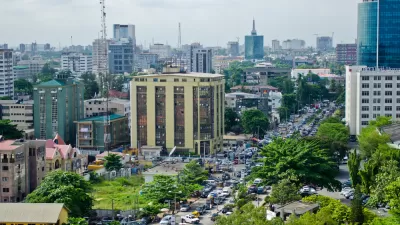Unlike Asia and South America, sub-Saharan Africa did not see birthrates fall in the second half of the 20th century. As a result, urban life in Nigeria heralds the challenges facing an increasingly populous planet, Elisabeth Rosenthal reports.
Currently the sixth most populous nation in the world, Nigeria is expected to double in size over the next twenty-five years, compounding already-disastrous living conditions for city-dwellers.
In Lagos, its largest city (indeed the largest in Africa), entire families often crowd into 80-square-foot apartments so narrow, they're referred to as "Face Me, Face Yous," with as many as 50 people sharing a kitchen and bathroom – assuming they still have access to running water. And with almost 50 percent of young people unemployed, the threat of crime and civil unrest are growing.
"Population is key," said Peter Ogunjuyigbe, a researcher from the small central city of Ile-Ife. "If you don't take care of population, schools can't cope, hospitals can't cope, there's not enough housing – there's nothing you can do to have economic development."
The Nigerian government is scrambling to develop new infrastructure, but it's impossible for construction to keep up with the booming population. While developing countries in Asia and South America have successfully curbed birthrates over the last few generations, it may not be easy for Nigeria to duplicate those results. "That transformation was driven in each country by a mix of educational and employment opportunities for women, access to contraception, urbanization and an evolving middle class," writes Rosenthal. "Whether similar forces will defuse the population bomb in sub-Sarahan Africa is unclear."
Even with rapid urbanization, fertility rates have only fallen one-fifth since 1975, from 6.8 children per woman then to 5.5 now. In addition to cultural pressures to embrace large families, Rosenthal explains, historical factors have forestalled the shift to low birthrates in countries like Nigeria. "Because Africa was for centuries agriculturally based and sparsely populated, it made sense for leaders to promote high fertility rates. Family planning, introduced in the 1970s by groups like Usaid, was initially regarded as foreign, and later on, money and attention were diverted from family planning to Africa's AIDS crisis."
FULL STORY: Nigeria Tested by Rapid Rise in Population

Trump Administration Could Effectively End Housing Voucher Program
Federal officials are eyeing major cuts to the Section 8 program that helps millions of low-income households pay rent.

Planetizen Federal Action Tracker
A weekly monitor of how Trump’s orders and actions are impacting planners and planning in America.

Ken Jennings Launches Transit Web Series
The Jeopardy champ wants you to ride public transit.

Rebuilding Smarter: How LA County Is Guiding Fire-Ravaged Communities Toward Resilience
Los Angeles County is leading a coordinated effort to help fire-impacted communities rebuild with resilience by providing recovery resources, promoting fire-wise design, and aligning reconstruction with broader sustainability and climate goals.

When Borders Blur: Regional Collaboration in Action
As regional challenges outgrow city boundaries, “When Borders Blur” explores how cross-jurisdictional collaboration can drive smarter, more resilient urban planning, sharing real-world lessons from thriving partnerships across North America.

Philadelphia Is Expanding its Network of Roundabouts
Roundabouts are widely shown to decrease traffic speed, reduce congestion, and improve efficiency.
Urban Design for Planners 1: Software Tools
This six-course series explores essential urban design concepts using open source software and equips planners with the tools they need to participate fully in the urban design process.
Planning for Universal Design
Learn the tools for implementing Universal Design in planning regulations.
Ada County Highway District
Clanton & Associates, Inc.
Jessamine County Fiscal Court
Institute for Housing and Urban Development Studies (IHS)
City of Grandview
Harvard GSD Executive Education
Toledo-Lucas County Plan Commissions
Salt Lake City
NYU Wagner Graduate School of Public Service



























